 Loading...
Loading...-
The attack on the United States Agency for International Development (USAID) was undoubtedly one of the most spectacular moves made right after Donald Trump assumed the US presidency. It sparked a huge international outcry, as an unprecedented move in decades of international collaboration. The decision put an almost complete freeze on a budget of around $40 billion, causing thousands of employees in the United States and dozens of other countries to lose their jobs and effectively bringing thousands of global aid projects to a near-instant halt.
This decision didn’t come out of the sky. However, the extent and speed surprised even critics of the current system of international aid. As brutal as the cracking down on USAID seems, these actions are part of a wider movement in many Western countries to fundamentally question existing institutions, processes, and funding for development cooperation.
The following article, therefore, will reflect on this decision’s consequences and put them into the framework of a wider “counter” movement. Will the US create a new system of international aid? What will be the impact on the European Aid System? How will other “new “donors react, e.g., China? And, finally, what will the impact and potential alternatives be for developing countries?
It’s ideology, stupid!
It is safe to say that fiscal concerns have not played a significant role in cracking down on the current USAID and related programmes. In the Heritage Foundation’s “Project 2025“, which many view as the blueprint for the second Trump administration, we can find a mélange of different motives behind the decision. Some are well-known and reasonable concerns, such as the lack of streamlining with the larger strategic objectives of US foreign policy. However, the real desire for disruption comes from a deep-rooted ideological opposition against the political direction in which USAID has taken over the last decades in the eyes of right-wing populists. They see these activities as “antithetical to American values. They serve to destabilise world peace by promoting ideas in foreign countries that are directly inverse to harmonious and stable relations internal to and among countries.” National and international organisations –the “aid industry”– are accused of promoting a “woke agenda” such as gender ideology, but also climate change-related activities, harming US interests. Interestingly, the role of “faith-based” institutions is very much emphasised, as a direct reference to one of the core voter groups of the MAGA movement. For the moment, it remains unclear with what kind of strategic interests a future, presumably massively shrunk cooperation should align with. It is against all experience that development aid can and should follow short-term foreign policy objectives. Specific expertise, but also certain independence and neutrality, must be ensured in many sensitive contexts abroad.
In line with the US dismantling or retreating from other international bodies and agreements, such as the Paris Climate Agreement, multilateral aid structures will be significantly drained of funds. The trend of the West losing its soft power capabilities and giving further space to authoritarian power, in particular China, will only speed up.
Europe as the lender of last resort?
Some voices immediately called for Europe to fill the gap as the decisions of the new Trump administration tore into the global system of development aid. Indeed, many European projects have been co-financed –such as with funds from the National Endowment for Democracy (NED)– and are now in danger. However, neither is Europe capable of fiscally compensating, nor should we ignore that structure, objectives, or operating regions of European aid are often quite different to USAID’s. With the new administration, a common value base is even more difficult to find.
Filling the gap: a new opportunity for non-democratic donors?
Many critics pointed out the “golden” opportunity for non-democratic donors like China or the Gulf countries to present themselves as reliable new partners for the developing world. The withdrawal could lead to a further weakening of development models based on human rights and democratic values at a time when authoritarian regimes are massively gaining ground on the basis of pretending to pursue a non-colonialist, non-conditional, and equal-based approach. It can be assumed that US direct humanitarian aid will continue. The most critical parts, however, are programmes related to promoting good governance and democracy. Whilst we will not see immediate and massive stepping in by authoritarian forces, the damage for the West as a whole is hard to revert.
Diversification or new dependencies?
The reaction to the shockwaves sent out of Washington will be immediately felt in many recipient countries. However, only once the fallout has settled in a couple of months will we be able to see different adaptation strategies, depending on the specific sectors and internal capacities of the countries. Moves towards diversification of donors will accelerate. In the worst case, we will see new dependencies aggravating existing ones. In the better cases, it is another long-overdue wake-up call for developing countries to reach out for effective regional cooperation and address their shortcomings in terms of sustainable development.
Conclusion
Global development cooperation will not stop with USAID’s collapse or, at the very least, its drastic restructuring. In addition to immediate effects, which will be disastrous in some places, they could ultimately have a catalytic effect on innovation and reorientation in international aid. However, Europe should not make the mistake of substituting the faltering US aid structures and should not try to stick to its own structures, which are also in need of reform. The shortcomings of traditional approaches to development cooperation, from contradiction with other policy fields such as trade, to the never-realised promises of self-sustained growth and development, need urgent remedies in Europe as well. Otherwise, voices calling to follow the Trumpian way will grow in Europe as well.
Sadly enough, the real harm to the United States –and the West as a whole– has already been done: the loss of intangible assets, such as highly skilled and motivated professionals, established networks and access to decision-makers, and confidence and reputation as a trustworthy partner and supplier of international common goods. New partnerships and cooperation models in international development relations are already underway. However, it is highly doubtful whether Western ideas and ideals will continue to have a significant influence in the developing South.
Peter Hefele Development Foreign Policy Trade

Peter Hefele
Axing Down Global Development Cooperation? The Implications of Shuttering USAID
Blog
05 Mar 2025
-
When combined, the EU and its member states rank as the second-largest donor of global development aid. Yet, there is hardly any public debate about the effectiveness, or even political legitimacy, of this policy field. The competition with ‘new’ donors such as China and India has raised fundamental questions about whether the concept of development as it has been pursued over the last 60 years, should undergo a complete revision and whether the traditional understanding of development itself needs to be abandoned.
This brief develops a new conceptual framework from a centre–right perspective to critically review current policies and suggest new approaches. If the established system continues, we will see a further delegitimisation of this important field of international cooperation and a reduction in the global influence of the EU.
Development Foreign Policy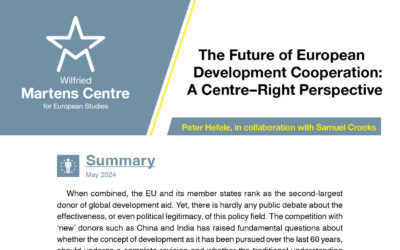
The Future of European Development Cooperation: A Centre–Right Perspective
Policy Briefs
28 May 2024
-
To some, it might seem odd that the Sustainable Development Goals (SDGs) would be of relevance to the highly developed industrial nations that form the EU. But the SDGs were not the first global target agreements of the United Nations. They were preceded by the “Millennium Development Goals” (MDGs), which set eight goals concentrated on combating poverty in the world, especially in developing countries. Its successor, the 17 SDGs, have a much broader reach in terms of goals and scope, and included highly developed countries and the EU as well. These developed societies face the same need as developing countries for a major transitionary and transformative change towards sustainable growth that protects the environment, helps communities and their inhabitants adapt to a changing climate, and which is more inclusive regarding social and resource-conserving goals. This paper shows that the European economic model of a Social Market Economy offers a good starting point for successfully mastering the structural change towards a more resource-efficient production. The European Economic and Social Committee (EESC), representing the voice of social partners and civil society in the concert of the EU institutions, contributes to the three pillars of sustainability – economic growth, social equity and ecological sustainability – reinforcing each other by balancing the right regulatory and institutional framework for transition.
Development Sustainability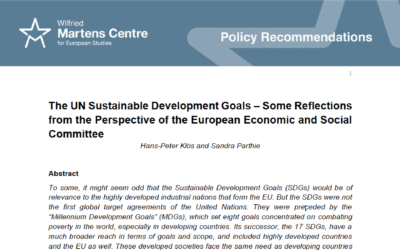
The UN Sustainable Development Goals – Some Reflections from the Perspective of the European Economic and Social Committee
Other
21 Jun 2023
-
On 25 November 2020, a majority of the European Parliament approved my report on improving the efficiency of development aid. The report puts efficiency and effectiveness back at the centre of development cooperation. It also establishes conditionality for third country recipients of development aid to promote joint priorities as well as EU policy objectives on, inter alia, migration management.
According to the UNHCR, almost 80 million people are currently displaced from their homes. While the COVID-19 pandemic has substantially reduced the number of irregular migrants reaching the Union’s shores, the numbers are still higher than those prior to 2015. In addition, EU agencies project that an increase of migrants will occur once the pandemic is under control. Economic migration is likely to continue to dominate irregular arrivals to the European Union for the foreseeable future.
Migration is, however, not limited to EU borders. As highlighted by the New Pact on Migration and Asylum, it is an issue we need to address globally and in cooperation with countries of origin and transit. As the world’s largest donor of development aid, the EU has an important part to play on the global arena.
Provisions I put forward in the report provide the European Union with guidance to improve migration management, including safe and orderly return, with due respect to fundamental human rights. It is the duty of a nation to accept the return of its citizens. As such, cooperation on returns belongs to the notion of good governance.
In addition, conditionality may also be applied to achieve the common objectives of eradicating poverty, reducing vulnerability to climate and environmental changes, and developing economic and trade policies. Such sustainable development in third countries may, in the long term, reduce the root causes of migration. Reducing the number of displaced people will be the most efficient way to secure safe, orderly, and manageable migration.
Conditionality provides the Union with an option to respond when a third country acts in a way that is harmful to European objectives.
Conditionality also serves a greater principle. As a member of the European Parliament and chair of the development committee, it is my firm belief that every euro spent must provide the highest level of efficiency. On this merit, EU institutions have agreed to include rule of law conditionality in the next long-term budget, with regard to cohesion funds spent within the EU. This central principle is now also enshrined in the development aid policy.
Let me stress that I would prefer conditionality not to be applied, but rather for our third country partners to promote joint objectives based on the spirit of cooperation. However, conditionality provides the Union with an option to respond when a third country acts in a way that is harmful to European objectives.
I am convinced that the Parliament resolution in question will be an important tool for the EU as a geopolitical actor, with regard to both effective development aid and migration policies.
Tomas Tobé Development Foreign Policy Migration

Tomas Tobé
Making Development Aid Dependent on Cooperation on Migration
Blog
26 Jan 2021
-
In the last few years, a swirl of publications and initiatives have attempted to develop the doctrinal foundations of ‘trumpism’ and to offer intellectual defences of right-wing populism, that most anti-intellectual of doctrines. One way or another, they have all amounted to a variation on national conservatism, the belief that nations are our historically grown ‘homes’ and that it is therefore the primary duty of conservatives to defend their specificities from the levelling encroachment of globalisation and international institutions. According to these apologetic treatments, that’s precisely what Trump and his political mates across the globe are up to.
There has been no shortage of outraged commentaries on such takes, but they have mostly come from the liberal left. It is therefore welcome that a robust conservative and classical liberal like Dalibor Rohac – a Slovak by birth, a resident scholar at the American Enterprise Institute and a research associate at the Wilfried Martens Centre for European Studies – took up the pen to offer a powerful rebuttal from the centre-right of the political spectrum.
Rohac’s treatment is quite conventional in his belief that the current ‘globalist’ international order has coincided with an unprecedented era of peace and prosperity. This alone should enjoin those right-wingers who now want to overhaul it to show some real conservatism and pursue at most its cautious and gradual reform. However, his book departs in important ways from mainstream opinions on globalism. It understands international institutions not as top-down, enlightened bureaucracies but as bottom-up, evolutionary creations subject to constant adaptations and devised as responses to concrete challenges that transcend national borders. Such challenges include the like of trade barriers, security, pollution and the management of natural resources. For his analytical toolbox, Rohac owes an acknowledged debt to the pioneering work of Elinor and Vincent Ostrom on the governance of the commons, federalism and polycentricity. His attempt to apply the Ostroms’ principles to international cooperation and European integration is cutting-edge and fruitful.
The book also contains a very unconventional reconstruction of what the author refers to as ‘the West’s globalist history’ and I have referred to elsewhere as ‘Europe’s supranational past’. Rohac convincingly contends that ‘international’ integration, and not the national state, has been the norm for most of European history. He reflects on the historical meaning of such polycentric and multinational structures as the Holy Roman Empire, which comprised large swathes of the continent for a millennium, the Hanseatic League and, more recently, the Gold Standard, which acted in everything but name and trappings as a global currency into the 20th century. Although he stops short of openly drawing this conclusion, Rohac’s concise treatment clearly concurs with a reading of the European project as, historically, a restoration more than a radical revolutionary break with Europe’s past. This should encourage conservatives to cherish the principle of supranational integration rather more than they have done lately.
A robust conservative and classical liberal like Dalibor Rohac took up the pen to offer a powerful rebuttal from the centre-right of the political spectrum.
Rohac’s related effort to revive a tradition of internationalist conservatism inspired by the likes of Friedrich Hayek, Ludwig von Mises, Alexander Rüstow and Wilhelm Röpke also seems worthwhile and even urgent. One could add to this group of – mostly liberal – thinkers other figures such as Alexandre Marc, Denis de Rougemont, Richard Coudenhove, Otto von Habsburg and the Christian democratic founding fathers of Europe. The real question, however, is not whether conservatism and supranationalism are compatible. They are, at least since Edmund Burke wrote of the ‘commonwealth of Europe’ and Prince Metternich proclaimed ‘I have taken Europe as my fatherland’. As the author mentions, the problem is rather that there can be different forms of supranationalism, not all of them equally palatable to a christian democratic or conservative taste. Even Hayek and Röpke, who were conservative liberals, would likely have reservations about some regulatory and bureaucratic excesses of today’s EU, not to talk about the postmodernist cultural rhetoric often underpinning its policies.
To rein in the rise of national conservatism, therefore, the centre-right ought to do more than merely develop a more convincing defence of globalism and European integration. It must also articulate a meaningful reform agenda based on stronger subsidiarity, the protection of national and regional identities and a more open emphasis on the cultural foundations of European unity. The book makes some important advances in this direction, for example by insisting on the need to limit the reach of international institutions through narrower mandates, as well as to open them up to bottom-up experimentation and market incentives.
To me, the one limit of the book is the author’s embrace of a liberal internationalist – if not neoconservative – outlook, as opposed to a ‘classical’ conservative one. On the one hand, Rohac defends a polycentric interpretation of international cooperation gradually evolving by trial and error and based on institutional diversity. On the other hand, he adopts a somewhat dogmatic view of the international society that acknowledges only liberal democracies as fully legitimate actors. This contains an element of liberal messianism, is subversive of the existing international order and restricts the range of acceptable institutional diversity and experimentation.
Relatedly, the book presents a limited view of political realism and connects it with a nationalist and Hobbesian outlook: ‘realism’, writes Rohac, ‘posits the existence of self-interested sovereign nation-states as the basic units of analysis, disregarding both the rules that might constrain their behaviour as well as the various governance structures that facilitate their cooperation—providing a perfect starting point for a Trump-like doctrine of unfettered national egoism’. Although this might be a correct characterisation of the ‘structural realism’ of American scholars like Kenneth Waltz and John Mearsheimer, it leaves out the classical realist European tradition of statecraft, which had its masters in figures like Metternich and Castlereagh and more recently found an outstanding epigone in Henry Kissinger. Metternich was perhaps the main exponent of international conservatism in the 19th century, and the chief theoretician and architect of an integrated supranational governance in Europe at the time.
Arguably, this tradition has some advantages over both the structural realism of Trumpians and the liberal internationalism preferred by Rohac. Unlike structural realists, classical realists attach importance to institutions and rules. Unlike liberal internationalists, however, they understand that functioning institutions and rules cannot be designed in the abstract by enlightened planners and based on universally valid principles. They are always culturally and historically embedded. As such, they can only flourish in a specific context and gradually evolve with it. This approach seems more attune to Rohac’s own understanding of globalism as an evolving ecosystem. Combined with his highly innovative arguments, it might not only help the centre-right counter conservative nationalism with a conservative and christian democratic internationalism. It might also contribute to formulating a new EU foreign policy doctrine more adapted to the emerging multipolar (dis)order than the currently prevalent saintly visions of the EU as a ‘civilian power’.
Federico Ottavio Reho Centre-Right Christian Democracy Development Values
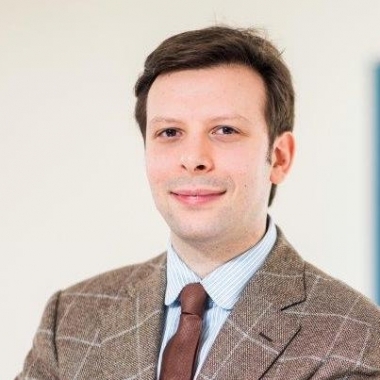
Federico Ottavio Reho
Globalism and the centre-right
Blog
11 Feb 2020
-
In 2007, Kofi Annan—then Secretary General of the UN—called the twenty-first century “the era of NGOs’. We think Mr Annan had little idea of how true his statement would prove to be, but probably not in the ways he imagined.
Annan referred to the importance of NGOs in policymaking, in mobilising public opinion and in holding power to account. In contrast, in the second half of 2018 NGOs – manifestations of civil society that are independent of the state – are increasingly becoming tools of political struggles. This concerns both relations between countries and the domestic situation in EU countries.
Several narratives on NGOs are emerging. The European centre-right, in contrast to its statist opponents on the left and right, believes in self-organisation of society and in the non-profit sector. A vibrant civil society and NGOs that can operate freely, are part of every liberal democracy.
However, this does not mean that civil society is on par with democratically elected institutions, as some Greens and leftists would have it. We also do not believe that governments have an obligation to finance every NGO, regardless of its professed principles and beliefs. At the same time, democratic governments should not impede NGOs’ work through punitive measures, legal discrimination and public bullying.
This is especially important, not only in view of the upcoming election to the European Parliament, but also in terms of a viable long-term outlook for democracy and transparency in the EU.
Starting with the international context, most of the European centre-right is aware of the normative and political threat that comes from the world’s authoritarian regimes. A new report on ‘sharp power’, developed by the Washington-based National Endowment for Democracy, documents the use by Russia and China of registered organisations that are linked to lobbying efforts on behalf of their mother countries.
Although these organisations are nominally independent, they are directed and financed by governments (a Martens Centre study published in 2016 looked specifically at Russian ‘government-organised non-governmental organisations).
What is more contentious, is narratives that cover domestic NGOs. First, governments in countries such as Poland, Hungary and, to some extent, Romania have been targeting the non-profit sector (often privately-funded) as an enemy of the ‘real people’ and the white and Christian European civilisation. The vocabulary used against these NGOs bears a strong resemblance to communist-era propaganda against any democratic opposition. For Christian Democracy and the wider centre-right, conspiracy theories inspired by the dark 1930s should be out of the question.
Second, NGOs have been active around immigration and asylum, often at the EU’s external sea and land border. Organisations such as Médecins Sans Frontières and countless others have been rescuing people drowning in the Mediterranean Sea. During the refugee crisis of 2015-16, other NGOs were often the only entities to feed and shelter refugees stranded the Western Balkans.
Things become really complicated when looking at the activities of humanitarian NGOs that signed up to save the lives of shipwrecked migrants in the Mediterranean, but end up being little more than ferry services straight from the Libyan coastline to Italy. Their refusal to cooperate with the Italian government has led to an open and largely unresolved conflict, resulting in ships being impounded.
NGOs in the immigration and asylum context have to be evaluated case-by-case, and though many perform important humanitarian tasks, some are clearly in contravention of EU and member state law. For example, activist organisations such as the ‘No Border’ network are openly violating the legal order of EU member states.
A third, and completely different, narrative about the NGOs exists in relation to the use of EU funds by organisations that campaign against the EU’s interests, sometimes openly spreading false information. The Martens Centre has highlighted political communication campaigns orchestrated in Germany and Austria by green and left-wing political parties, and associated civil society organisations, against a vital EU interest in concluding the Transatlantic Trade and Investment Partnership Agreement (see also here). These concern go hand-in-hand with concerns over inequity, fragmentation and a lack of transparency in financing from the EU budget.
What should be the line of argument for the centre-right?
Europe’s conservative, Christian Democrat and liberal forces should insist on the NGO financial and lobbying transparency, whether the lobbying is done for autocrats, business interests or charitable purposes; but they need to refuse Russia-style punitive transparency, the only goal of which is harassment of activists.
The centre-right parties should insist on clarity and a level playing field in EU and government funding for NGOs. They should reject those NGO campaigns that blatantly distort the facts. There is no obligation for the EU to finance organisations fundamentally opposed to it.
Europe’s centre-right should discuss how NGOs influence public discourse and which methods are used to this aim, but it should firmly object to government centralisation and control of the independent sector. All this because subsidiarity, our cherished principle, is also about letting society govern itself.
Vít Novotný Roland Freudenstein Development Human Rights Social Policy Society

Vít Novotný

Roland Freudenstein
Non-governmental organisations and the centre-right: it’s complicated
Blog
04 Jun 2018
-
“People tend to forget that it is not just about pro-bono work in the European neighborhood; it is also our own interests that are at stake there.” This point, made by Martens Centre Executive Tomi Huhtanen, kicked off a debate organised in Brussels on 31 January 2017 on the strategic rethink of the European Neighbourhood Policy (ENP).
The EU’s current ENP policy is focused on supporting democratic transformation and creating economic opportunities in its neighbourhood through technical cooperation and economic integration.
But with growing instability including the Brexit decision, rising Euroscepticism, new ‘hybrid warfare’ threats, an assertive Russia, the rise of Islamic State and declining US engagement in European security, Europe has to take bold and decisive action to secure its long-term interests.
As the spillover effects of instability in the regions outside of the EU are taking a significant toll on the Union, rethinking the way it deals with its neighbourhood has to play a central part in the EU’s Global Strategy.
According to Salome Samadashvili, former EU Ambassador and current member of the Georgian Parliament, “the EU must graduate from a global actor to a geopolitical actor.” In order to achieve this, she argues for a pragmatic, yet principled and creative approach to EU’s policies in its neighbourhood.
EU institutions think in five or ten year terms. But if you operate in Georgia or in Libya you only have the luxury of planning up to one month in advance. Salome Samadashvili, former EU Ambassador and current Georgian MP
Sandra Kalniete, Latvian Member of the European Parliament added that countries in the neighbourhood need to be assessed case-by-case; for too long, the EU has been trying to apply a one-size-fits-all approach that has not benefited neither the EU, nor its partners.
During the event, Kalniete also emphasised a shift “from rule-based to deal-based diplomacy” taken by the new US administration; however, she maintained that the EU needs to stay true to its values while projecting its power abroad.
Not giving up our values while adding more pragmatism to the way Europe deals with its neighbourhood was a point also echoed by Bruno Lété, Security and Defence Transatlantic Fellow with the German Marshall Fund of the United States.
In ten years from now China will be an inevitable factor in EU’s neighborhood policy towards the Mediterranean. Bruno Lété, Security and Defence Transatlantic Fellow, German Marshall Fund of the United States
Subsequently, he argued for more short-term flexibility rather than long-term planning on the part of the EU. His third recommendation was that any successful foreign policy needs to be coupled with the ability to project power; this is where, according to Lété, NATO and EU-NATO cooperation come into play. Rather than debating where to place shared defence assets, the West needs to work more on efficient ways of delivering training, education and financial support to its partners.
Defence Development Foreign Policy Neighbourhood Policy Security
EU’s foreign policy needs values and muscle to survive
Other News
01 Feb 2017
-
Regional and local authorities already promote their own policies and actions in the international arena for humanitarian, political, commercial, cultural and institutional reasons. From cross-border to decentralised cooperation, under the concept of City diplomacy, local authorities often move independently and actively, both in the international arena and in the EU’s decision-making processes.
They act during conflicts, providing peace-building and dialogue opportunities, and take action in post-conflict regions or regions in need. This form of diplomacy complements traditional diplomacy and is mostly activated when the latter is frozen or required to remain low profile for contingent, political reasons. These new actors, with strong devolved powers at home and strong political leadership, deserve more attention from international players such as the European Commission and some of the United Nations’ agencies.
The current scheme of international cooperation is overly rigid. There is a need for more flexibility so that support—including financial support—can be better targeted to meet specific needs. This could lead to regional and local actors becoming direct recipients of international financial support for planning and running decentralised or bottom-up forms of cooperation, partnership and political dialogue.
Read the full article in the December 2016 issue of the European View, the Martens Centre policy journal.
Filippo Terruso Development Foreign Policy Regionalisation
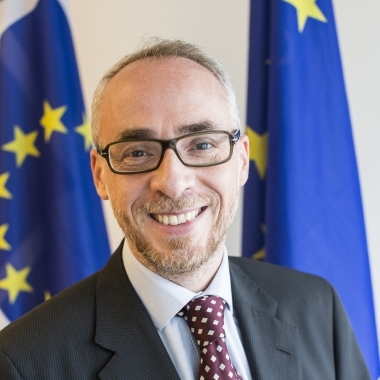
Filippo Terruso
Complementing traditional diplomacy: regional and local authorities going international
Blog
07 Nov 2016
-
Joris Luyendijk was invited by The Guardian in 2011 to write a blog about the City of London and learn about the financial world. He did so for two years. Known in The Netherlands as a journalist and writer on the Middle East, he wrote a book entitled Het zijn net mensen (Hello everybody) in which he separated fiction from reality in journalism. Luyendijk himself knows little more about the financial world than we do and he had to find his way into the City to meet bankers, traders, analysts, brokers, lawyers, etc.
As an anthropologist he tried to go native in the world of finance. His book, translated from its Dutch title This can’t be true, is a summary from his blog for The Guardian, in which the mist of the credit crunch slowly evaporates. The reader gets a feeling of these faceless humans in their bespoke suits, its unwritten rules, taboos and hierarchies in this city that functions like a village or tribe. The book exposes the secrecy of the financial world and how it developed its own rules and (inter)national laws. The bankers’ personal opinions give the reader a human feeling of a world that is often considered in the popular media to be made up of little more than incalculable economic theories.
The problem described in the book is the onset of the financial crisis in 2008, which according to his interviewees had, at it’s a core, a small group of projects and people. Even the people that were most involved did not expect this crisis to happen. Over lunches and glasses of wine, Luyendijk learns about the reasons for the 2008 crash in the financial world. A lot of profit making by traders and brokers was, and still is, based on short-term thinking. Job insecurity makes the bankers less involved with their bank and therefore they are not concerned with long-term consequences. The CEO’s of the big banks only seem to be interested in profits and have little care about the impact or consequences of their products. And all of these pawns play with other people’s money for banks that are listed and have grown so big that they have become too big to fail.
Everybody was shocked when the credit crunch happened, nations, consumers and banks all agreed that something had to be done to alter financial practices. But, years later it looks like it is business as usual notwithstanding the increased financial regulation imposed by both the EU and British authorities. The banks are still too big. The so-called Chinese walls that separate divisions within banks, and the many extra rules are still breeched. And the same outrageous bonuses are back in the city. Bankers explained to Luyendijk that the caveat emptor, the contract law principle, of which the buyer should beware is still in a place. Hence, the buyer is responsible for any loss concerning the purchase, not the broker.
Joris Luyendijk ends his book the way he starts, with a story of him being on a plane when he sees a big flame coming out of the engine. He turns to his neighbous, but everybody tells him that all is well. He makes his way to the front of the plane and finds out that the cockpit is empty. The system with its perverse incentives is the problem and if we do not tackle the problem, 2008 will happen all over again. The increased financial regulation imposed in the EU since 2008 is only the first step in making the financial system safer for us all.
Pieter Habets Banking Crisis Development

Pieter Habets
This Can’t be True: A book review
Blog
30 Jul 2016
-
Joris Luyendijk was invited by The Guardian in 2011 to write a blog about the City of London and learn about the financial world. He did so for two years. Known in The Netherlands as a journalist and writer on the Middle East, he wrote a book entitled Het zijn net mensen (Hello everybody) in which he separated fiction from reality in journalism. Luyendijk himself knows little more about the financial world than we do and he had to find his way into the City to meet bankers, traders, analysts, brokers, lawyers, etc.
As an anthropologist he tried to go native in the world of finance. His book, translated from its Dutch title This can’t be true, is a summary from his blog for The Guardian, in which the mist of the credit crunch slowly evaporates. The reader gets a feeling of these faceless humans in their bespoke suits, its unwritten rules, taboos and hierarchies in this city that functions like a village or tribe. The book exposes the secrecy of the financial world and how it developed its own rules and (inter)national laws. The bankers’ personal opinions give the reader a human feeling of a world that is often considered in the popular media to be made up of little more than incalculable economic theories.
The problem described in the book is the onset of the financial crisis in 2008, which according to his interviewees had, at it’s a core, a small group of projects and people. Even the people that were most involved did not expect this crisis to happen. Over lunches and glasses of wine, Luyendijk learns about the reasons for the 2008 crash in the financial world. A lot of profit making by traders and brokers was, and still is, based on short-term thinking. Job insecurity makes the bankers less involved with their bank and therefore they are not concerned with long-term consequences. The CEO’s of the big banks only seem to be interested in profits and have little care about the impact or consequences of their products. And all of these pawns play with other people’s money for banks that are listed and have grown so big that they have become too big to fail.
Everybody was shocked when the credit crunch happened, nations, consumers and banks all agreed that something had to be done to alter financial practices. But, years later it looks like it is business as usual notwithstanding the increased financial regulation imposed by both the EU and British authorities. The banks are still too big. The so-called Chinese walls that separate divisions within banks, and the many extra rules are still breeched. And the same outrageous bonuses are back in the city. Bankers explained to Luyendijk that the caveat emptor, the contract law principle, of which the buyer should beware is still in a place. Hence, the buyer is responsible for any loss concerning the purchase, not the broker.
Joris Luyendijk ends his book the way he starts, with a story of him being on a plane when he sees a big flame coming out of the engine. He turns to his neighbous, but everybody tells him that all is well. He makes his way to the front of the plane and finds out that the cockpit is empty. The system with its perverse incentives is the problem and if we do not tackle the problem, 2008 will happen all over again. The increased financial regulation imposed in the EU since 2008 is only the first step in making the financial system safer for us all.
Pieter Habets Banking Crisis Development

Pieter Habets
This Can’t be True: A book review
Blog
30 Jul 2015
-
On 26 April 2015, former prime minister of Slovakia Mikuláš Dzurinda will be taking part in the Kyiv Half Marathon. He will be leading a team of runners including members of the European Parliament Dita Charanzova (Czech Republic), Ivan Štefanec (Slovakia) and Roman Babjak, European Commission Programme Manager. Under the slogan ‘Run for Ukraine’, the team led by Mikuláš Dzurinda wants to send a clear signal that responsible European leaders have a moral obligation to show solidarity with Ukraine during the comprehensive reform process the country has embarked on.
‘This is a deeply symbolic act to show our support and solidarity with the Ukrainian people. I see many similarities between running a marathon and implementing reforms: both require long-term commitment, they can be painful at times, but nothing compares to the rewarding feeling of crossing the finish line. And they both require team effort’, said Mikuláš Dzurinda, who is currently President of think tank and political foundation Wilfried Martens Centre for European Studies, based in Brussels.
‘Run for Ukraine’ is part of the ‘Ukraine Reforms’ campaign, an initiative of the Martens Centre led by its President Mikuláš Dzurinda to bring together the expertise of senior EU decision makers in support of the reform process in Ukraine. The initiative is supported by local partners including Ukrainian NGOs Reanimation Package for Reforms and Center UA, as well as the Kiev School of Economics.
The Kyiv Half Marathon is an annual international sports event which aims to promote a healthy lifestyle and to consolidate Ukraine’s position on the international marathon circuit. For the 2015 edition, organisers are expecting more than 6,000 participants to tackle the 20km run.
Mikuláš Dzurinda is the former prime minister of Slovakia (1998-2006) and current President of the Wilfried Martens Centre for European Studies. Previously, he has held various positions in government since first entering politics in 1990. Dzurinda introduced far-reaching reforms which have enabled Slovakia to successfully join the EU and NATO. In his free time, he is also a committed marathon runner with notable achievements. In November 2001 he took part in the famous New York Marathon to show solidarity with the American people following the 9/11 terrorist attacks.
Democracy Development Eastern Europe Economy
Mikuláš Dzurinda runs Kyiv half marathon in show of support for Ukraine
Other News
20 Apr 2015
-
Acemoglu and Robinson have produced a book that has attracted a lot of interest and discussion amongst the ranks of political scientists, institutional theorists and development economists. They attempt to answer a fundamental question that has occupied some of the greatest minds of our age and that has produced a number of illustrative theories.
It is no mistake that the writers choose to address all these theories in the second chapter of the book (titled under the provocative label “Theories that don’t work”). First, they criticise Jeffry Sachs’s approach of economic geography and move on to tackle the vast bibliography that attempts to associate cultural characteristics with economic prosperity (here they point to Max Weber and his monumental work on the Protestant ethic and the spirit of Capitalism).
They try to deconstruct what they call the ‘ignorance hypothesis’: the theory that political leaders simply do not know the way to lead nations towards prosperity and sustainability. The two authors point out that all these theories fail to explain long-term trends of inequality. They also fail to account for the contributions and the effects of cultural exchanges; of political horse-trading and of the numerous financial aid programmes that have been offered in order to tackle global inequality.
The two renowned professors articulate at length their main argument which is easy to understand and supported by strong historical and modern empirical evidence.
For Acemoglu and Robinson, the main reason that nations prosper or collapse has to do with the structure and the functioning of their central institutions. Concretely they go further than other theorists (see North, Wallis and Weingast in ‘Violence and Social Orders: A Conceptual Framework for Interpreting Recorded Human History’, 2012) saying that having the effective monopoly of violence or even the ability to form ruling dominant coalitions is not enough. They argue that it is necessary for the majority of the population to be included inside the governing structures. Inclusiveness here is not strictly limited to the input side of the political process. It also refers to the equal (or at least to the fair) apportioning of economic benefits.
In fact, the notion of inclusiveness, as used in ‘Why Nations Fail”, implies that having people participating at the input phase of policymaking, would inevitably lead to the creation of rules, norms and conventions that will also promote fairer output sharing. Thus the book argues that the fate of nations is closely correlated to whether they are ruled by extractive (that disseminate benefits to limited privileged groups) or inclusive institutions.
A quite significant part of the book is dedicated on listing and explaining cases that are meant to confirm the original hypothesis. The most telling and characteristic example supporting this hypothesis regards the city of Nogales- which lies right on the border between the US and Mexico. The city is administrationally split in half- the southern part is governed by the Mexican national and regional authorities, while the north forms part of the US. Unsurprisingly, despite their common geographical location and their regular cultural exchanges, the US part is far more prosperous rather than the Mexican one.
For the writers it is obvious that this is because of the different respective national and regional institutions that are operating in the two parts of the city. US institutions are far more inclusive and prosperous as opposed to the Mexican extractive state. ‘Why nations fail’ is a compelling book that attempts to explain and interpret the mechanics of history by adopting a macroscopic method to it. The approach used in the book was heavily influenced both by institutional theory (as developed by Douglas North) and by Lipset’s theses on democracy and economic development.
However, the book is not bereft of imbalance.
The argumentation about inclusiveness as the central factor in whether nations fail or prosper does not acknowledge other important exogenous factors that shape the status of nations. For example, the book fails to point out that violence between states is also a major variable that can decide the emergence or the destruction of nations. Carthage was raised to the ground not because its institutions were not inclusive enough but because it faced a powerful enemy (Rome) that, at a certain point, had focused all its efforts and resources on destroying the city. Similarly, global economic imbalances can lead nations with inclusive democratic institutions into chaos and disorder. For example it is undeniable that the global economic turmoil that erupted in the 1920acontributed to the fall of numerous European democracies and thto the rise of fascism.
Further, the causality between inclusiveness and success is not sufficiently demonstrated. There are several examples of nations that had inclusive and functional institutions but still failed. Inclusive democratic institutions do not guarantee the establishment of governments that are responsible and prudent. It is even possible that the electorate will give power to a government that will fgovern destructively. Such governments may lead nations into druin and the margins of history. Collective rationality does not necessarily lead nations to the best decisions.
In today’s globalised world exogenous variables such as technological trends; international dynamics; security and economic risks can prove to be as decisive for the fate of a nation as its institutions. Acemoglu’s and Robinson’s argument is far from wrong but it is not the whole story of modern governance and nation-building. “Why Nations Fail” is without a doubt an insightful book but it is also clear that its authors would prefer it to be a magnum opus regarding the study of institutions and statecraft. Me thinks this is not the case.
Development Economy Leadership Macroeconomics Society
Why nations fail: A book review
Blog
18 Mar 2015
-
Book review: European Spring: Why Our Economies and Politics are in a Mess and How to Put Them Right, by Philippe Legrain
The efficiency of Europe’s reaction to the post-2008 economic crisis continues to fuel a vibrant debate. Was austerity the best solution to the problem or did it make things worse by creating a vicious circle of underdevelopment? Did European leaders respond effectively to the challenge or did they get carried away by developments which they just couldn’t control? And what about the European Union itself? Was the crisis a positive test for its coherence or did it prove that it was ill-equipped and badly prepared to deal with extraordinary conditions?
This debate lays the background of Michael Legrain’s analysis which can be found in his much discussed book, European Spring. Legrain argues that Europe has made a series of mistakes, the most important of which is the obsession with fiscal austerity. For Legrain austerity measures not only did not cure the illness of public debts, but on the contrary plunged the members of the European Union into a much deeper recession. The ‘medicine’ had exactly the opposite results than the ones expected. It drained economies of valuable resources without dealing with the deeper underlying causes of the problem: Europe’s low productivity and low competitiveness in comparison with the United States, China, India, Brazil, as well as other emerging economies. He even suggests that the German example, which is presented as the model that other European countries should follow, is nothing more than an illusion.
Apart from describing the grim picture, Legrain makes suggestions on how to build a brighter future for Europe. He seeks the answer in a combination of economic and political renewal. European economies should try to become more adaptable to rapidly changing conditions: openness and flexibility seem to be the key words here. From a political point of view, he argues that Europe should not hesitate to experiment with new forms of democracy (including direct democracy) which will make citizens more actively involved. Economy and politics are seen as the two sides of the same coin. Despite the great obstacles, the author remains optimistic. On condition that European countries make the necessary reforms, he believes that they still stand a good chance of overcoming these obstacles and that the European Union will continue to remain a focus for development in the long term.
Legrain’s book is crisply and obviously benefits from its firsthand knowledge of EU decision making at the highest level based on his period as an Economic advisor to then Commission President Barroso. His arguments are very well articulated and can be easily understood by the average reader. He appears to have an answer to every question. However, one cannot refrain from thinking that many of the things he proposes are easier said than done. Innovative ideas often seem too good to become reality. But that’s exactly what makes them ever more appealing!
Antonis Klapsis Crisis Development Economy European Union Macroeconomics

Antonis Klapsis
Easier said than done
Blog
16 Dec 2014
-
In What Money Can’t Buy, world renowned American political philosopher and Harvard Professor, Michael J. Sandel bravely takes up the challenge of trying to answer one of the fundamental questions of human history: what money should and should not buy.
Skipping the usual elaborate introduction, Sandel begins by illustrating how modern society has become a global marketplace where nearly anything can be purchased for the right price. Sandel presents a collection of examples to strengthen his case. For instance, so called ‘concierge doctors’ in the US now offer their services for annual fees ranging from $1,500 to $25,000. A move made possible by the fact that standard doctor’s appointments in the US often have to be hurried affairs because of the low reimbursement rate offered by insurance companies to primary care doctors for routine appointments. Those who are willing to pay the amount can count on “absolute, unlimited and exclusive access to your personal physician.” The drawback, of course, is that it’s unfair to those who are not part of the happy (wealthy) few.
Sandel continues by illustrating that as a result of this ‘marketisation’ of society, people are often happy to pay off the moral obligation to adjust to social norms if they can. For example, introducing a fine for parents who came late to pick up their children from a nursery school did not reduce the number of late-arriving parents, but actually doubled it. The parents treated the fine as a fee they were willing to pay. Picking up a child therefore becomes a market relationship with the teacher/school.
Market reasoning however, has no objections to these notions of unfairness and moral obligations. It relies on the thought that free markets contribute to societies’ well being by allocating the goods to the buyers who value them most highly, based on their willingness to pay. Sandel concurs to a certain point, but argues that market reasoning is incomplete without moral reasoning. He argues that when market reasoning is applied to more morally charged issues such as love, friendship, sex, education, health or environmental protection, it is not plausible to assume that everyone’s preferences are equally worthwhile. Some of these goods, he feels, should be excluded from the exchange-value logic or else they will eventually lose their value. The essence of this argument can be traced back as far as Aristotle. In that sense, Sandel’s analysis offers an easy-to-read update of some classical held ideas.
Although written in 2012, the topic remains relevant in the current ‘collaborative consumption’ society in which (private) people with limited resources connect to those with under-used assets in need of some extra cash. Virtually everything is up for sale and we all become small entrepreneurs on the side. Accordingly, society slowly transforms in a fully fledged business industry. Not that there’s anything wrong with entrepreneurship, the economy thrives on it, but the more extensive this ‘collaborative consumption’ becomes, social gatherings will more and more revolve exclusively around possible commercial transactions.
In an era of increased consumption, Sandel’s well written analysis of how money has infiltrated our lives offers a differing view. A point made especially relevant in the aftermath of arguably the worst economic crisis since the 1930s. His main argument that we should decide what values should govern the various domains of social and civic life is a strong one; market rationality has become dominant to a point where respecting social norms is at stake.
The main problem of the book is that the vast majority of the examples of commodification he presents, are American. This harms the universality of his argument. Another obstacle for the book to become an undisputed classic (like some of his previous works) is the sheer volume of these examples; it does not leave ample room for a thorough analysis.
Interesting, Professor Sandel is himself also for sale. For an extraordinary amount, he will show up for a lecture to talk about what money can’t buy!
Barend Tensen Development Ethics Social Policy Society Values
Barend Tensen
What money should and should not buy
Blog
14 Nov 2014
-
I have been in Hangzhou in the past week attending a Global Investment Conference organised by Euromoney. Hangzhou was for a time the capital of China and the biggest city in the world. It is about 200 km from Shanghai, or an hour’s journey on the high speed train, a trip that I was told costs only 10 euros. Hangzhou was a centre of the silk business and was visited by Marco Polo. Silk from Hangzhou went along the ancient Silk Road all the way to Europe, thereby making Hangzhou one of world’s first globalised economies.
I spoke in Hangzhou just as the Asia Europe Economic Meeting (ASEM) of heads of Government was taking place in Milan. As the President of the European Council, I attended the first ever ASEM meeting in Bangkok in 1996. I met the Mayor of Hangzhou and key commercial and political figures.
Since 2010 there has been a huge surge in outward investment from China in the rest of the world, jumping from 6.1 billion euros to 27 billion euros in just three years. This investment is going into buying high tech companies, companies with globally known brands, and tourist resorts (like Fota in Cork). Just as China’s export drive enabled it, not only to gain income but also to gain market knowledge, this wave of investment is also designed to strengthen China’s global competitiveness and sophistication.
Children in the Shanghai are getting the highest test results in Maths, Science and Reading comprehension in the global PISA tests, which shows that they will provide strong competition for European and Irish children in the global economy. Irish Universities are accepting Chinese students and also investing in developing University facilities in China. This will help China to become a high income economy, its people enjoying lifestyles that will make similarly exorbitant demands on global resources, to the ones already being made by European and American lifestyles consumers.
Wage levels are rising fast in China, as demand for workers is beginning to exceed supply, partly thanks to the one child policy. China is losing low cost jobs to Vietnam and Mexico, so it has no choice but move higher up the value chain.
There is a shift in the allocation of credit away from big, relatively inefficient, state owned heavy(and often polluting) industries, towards privately owned businesses in the consumer goods sector. While the raw GDP growth rates in China may decline as a result, the life style enhancing quality of future GDP will improve.
China is becoming a middle class country, with middle class tastes and material aspirations. With wealth has come anxiety, with many Chinese wanting to invest some of their savings overseas. This provides opportunities for the Irish international financial services industry.While I was in Hangzhou, the protests in Hong Kong were still under way. The protesters wanted anybody to be eligible for election, not just candidates approved by a single nomination committee. I read an article on this controversy in the “China Daily”, by an Indian Professor, M D Nalapat, entitled “Hong Kong must avoid the democracy trap”, which challenged the notion that, at every level of economic development, democracy is a guarantor of economic success.
He also said: “ Political chaos can act as a speed breaker for rising Asian economies, dampening the challenge they pose to western counties. Iraq, Egypt, Libya and Ukraine are examples of countries where hundreds of thousands of youths believed that replacing of existing structures through street protest would result in a better life. Instead what they have got are deteriorating living standards and increasing insecurity.”
This is unfortunately a fair comment, and demonstrates the danger of making exaggerated claims of automatic economic advantages from any change of governmental system. Democracy requires patience and self restraint, sometimes absent in recently liberated societies.
Professor Nalapat went on: “Hong Kong is still moving upward, when the present generation in the US and the EU are worse off than the generations preceding it”
This is a superficial comment. Mature economies will never have, or need to have, the same rates of economic growth as economies, like China, which are in the “catch up” phase. Indeed, there is a case to be made that, beyond a certain level of economic development, diminishing returns in human wellbeing and environmental quality set in. 5% plus annual growth rates cannot continue to infinity…..anywhere in the world.
It is not surprising that an article like Professor Nalapats’ should appear in the “China Daily”, but is troubling that it should be written by an Indian, an inhabitant of the world’s largest democracy, a country in which there are 3 million freely elected legislators at differing levels of government, with real competition between parties unlike the tightly controlled system obtaining in China.
But Professor Nalapat is showing that people in the developing world are watching European and North American democracies, as we squabble about how to restore dynamism and optimism in the wake of the 2008 economic crisis, and are drawing conclusions about our systems of government, and the capacity of those systems to enable us to get our economic act together, and democratically to reconcile citizens expectations with economic realities.
John Bruton Democracy Development Economy Education Trade
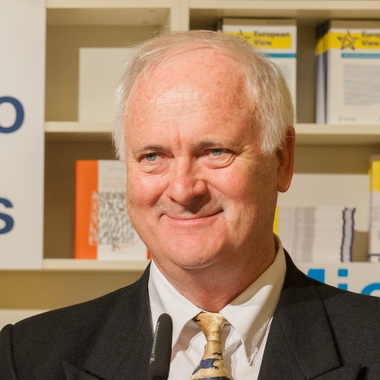
John Bruton
Reflections from the Silk Road
Blog
20 Oct 2014
-
A spectre is haunting us – the spectre of ‘pikettyism’. Originated in France, it draws its strength from a book by economist Thomas Piketty whose work on the historic trends of capital inequality has bridged the gap between academic research and a mainstream audience. His central finding – that inequality will continue to rise underpinned by a disproportionate concentration of wealth in relatively few capital owners – has particularly delighted the progressive establishment in the US, with Paul Krugman and Joseph Stiglitz throwing all their weight behind Piketty and making his study into the economic sensation it became. The risk now is that socialist governments in Europe will embrace this seemingly new rationale for supporting increased taxation and government intervention in the economy.
Piketty is convinced that, if left unchecked, the dynamics of capital accumulation will produce a level of inequality incompatible with our democratic societies. His diagnosis borrows a great deal from the ‘iron laws’ that periodically appeared in nineteenth century economics to predict the catastrophic outcomes of capitalism’s contradictions. His therapy seems little more than a nostalgic update of the confiscatory fashions embraced by most governments until the late 1970s, when top marginal tax rates and inheritance taxes were often above 80%. A century-old theory combined with policies of the 1960s seems hardly a new frontier of progressive economic thinking. In fact, the only policy innovation of the author is a proposal that he himself does not hesitate to define utopian: a progressive global tax on capital enforced through a high level of international coordination. My impression is that such proposal is worse than utopian: it is mistaken. And so are most policy prescriptions in Piketty’s book.
To begin with, Piketty has a very unrealistic view of capital. He identifies capital as all ‘nonhuman assets that can be owned or exchanged on some market’ and treats any income from capital, be it interest, dividends, profits, royalties or other, as a form of parasitic rent. This makes him blind to the fundamental entrepreneurial dimension of capital investment and accumulation in a free society. In a market economy, capital is not just stockpiled so as to produce certain returns automatically: it must be employed productively in activities that are successful and add value to the economy. Piketty’s theory has no place for market competition and entrepreneurial profit, possibly the two most important factors in a market economy. Furthermore, the optimal degree of government control of national income comes out of Piketty’s book as a purely technical problem, so that the author sees ‘no reason why a country cannot decide to devote two-thirds or three-quarters of its national income to taxes’.
Unfortunately, there are excellent reasons why even a far lower threshold has proved to be unsustainable in the past. Incidentally, these happen to be the reasons why a wide consensus in favor of a dramatic reduction in the size and scope of government emerged since the late 1970s. The simple truth is that government is too often inefficient in its regulatory, economic and welfare interventions. It invariably operates by establishing bureaucracies based on centralized control which grant all sorts of privileges and special protections. In fact, ‘rent-seeking’ by special groups has been long recognized as one of the main drivers of the growth in government spending. Piketty’s view of government officials is as idealized as his view of capitalists is demonized. The mundane truth is that both tend to be self-interested individuals acting in accordance with the incentive structure they face. While competition in the free market acts as a balancing force that tends to align individual incentives with social welfare, no such mechanism exist in government.
The moral implications of Piketty’s argument are even more questionable. The obsession of some economists with fighting income inequality is highly misguided. We accept market freedom because it creates a ‘society of incentives’ where everybody can make the most of his talents and innovative abilities and reap the full benefits of them. The rules of this game imply that some of us may get much richer than others and should have the right to freely employ their wealth and bequeath it to whomever they like. Income inequality is the price we pay in order to make our societies more dynamic and innovative, ultimately to the benefit of everyone. Extensive taxation and redistribution may make our incomes more equal, but it will not make any durable contribution to reducing overall levels of poverty.
Instead, the virtues of market freedom are unfolding before our eyes and they have been lifting millions of people out of poverty and deprivation in the last decades. Today’s China is characterized by striking and extreme inequalities. Are we really to conclude that the miserable equality of pre-capitalist China was preferable because it did not offend the social sensitivity of progressive economists? It is no chance that Piketty is completely silent about the economic miracle that has reawakened entire continents after centuries of stagnation and decline. He is too obsessed with widening income inequality in the West to care about poverty reduction in the East and the South. However, it seems to me that the most meaningful moral issue is not by how much my neighbor grew richer than me in the last years, but how many fewer people are starving in the world. To my knowledge, there is no government program of income redistribution that ever contributed to this objective anywhere in the developing world.
Like it or not, it has been economic policies traditionally labelled as conservative that were the most progressive in their effects. In the past generation, the most ambitious leaders of the centre-left (Clinton, Blair, Schröder) were courageous enough to recognize this simple lesson of history and turn their back on the old-fashioned policies of the past. Is it pure chance that their more traditional successors were never capable of repeating their landslide victories in recent years? Piketty’s theories may well be able to win over the nostalgic leaders of the European left, but I have the impression that we can still count on the electorate to look past his simplistic solutions and focus on real policies that will make our societies more productive and prosperous in the long run.
Federico Ottavio Reho Development Economy Social Policy Society Values

Federico Ottavio Reho
Confronting Piketty and his mistaken concept of inequality
Blog
26 Jun 2014
-
This policy brief analyses the current efforts by the EU and its member states to provide development aid to third countries. It concentrates on the Marshall Plan with Africa. Proposed by Germany, this plan is intended to bring cooperation between Europe and Africa to a new level. The study examines this plan in light of debates on the impact of development aid on third countries in general, and on migratory dynamics in particular. The specific focus is on aid conditionality related to cooperation on migration. The brief shows that increasing development aid does not necessarily lead to a decrease in migration. The available evidence suggests that conditionality in the provision of development aid is not effective in reducing the propensity to migrate.
The policy brief makes recommendations for future EU–Africa cooperation. It suggests that, to ensure a regular dialogue between the two continents, Africa should remain high on the agendas of both the EU and member states. Following the approach taken by the Marshall Plan with Africa, the brief argues that migration-related conditions should be attached to the provision of development aid only with caution. Aid ought to be primarily targeted at creating good governance and strengthening public services.
The views expressed in this paper are the sole responsibility of the author. They are not necessarily shared by the Wilfried Martens Centre for European Studies or the European People’s Party.
Development European Union Migration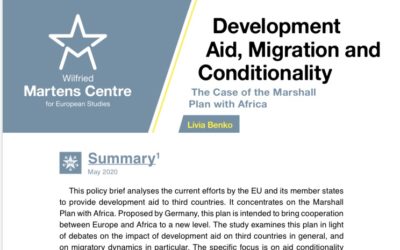
Development Aid, Migration and Conditionality – The Case of the Marshall Plan with Africa
Policy Briefs
05 May 2020
-
It is a common perception that poverty is fertile breeding ground for terrorism. Or at least, fuel for such activity. But not all poor areas produce extremism; we know where young men absorb extremist ideologies, and where, for instance, jihadists receive their training. In the beginning we bumped into the problem of definition; what is terrorism? What kind of terrorism are we looking into? Should we leave, say, separatist acts outside? Then the decision had to be made: this conference was to concentrate its efforts on understanding the logic and driving forces behind Islamist terrorism, and whether a better directed development policy could play any role in fighting it – given that poverty and lack of opportunities do play a role in an individual’s decision to join a radical group. Security in Europe – or globally, for that matter – is of course not entirely dependent on religious fanaticism. There are new threats we are aware of, and which we should better prepare for. There was also a question about the possible links between security and development, and how they interact.
Development Extremism Foreign Policy Security
Fight against terrorism and Development Policy: Two Sides of the Same Coin
Collaborative
02 Nov 2008


